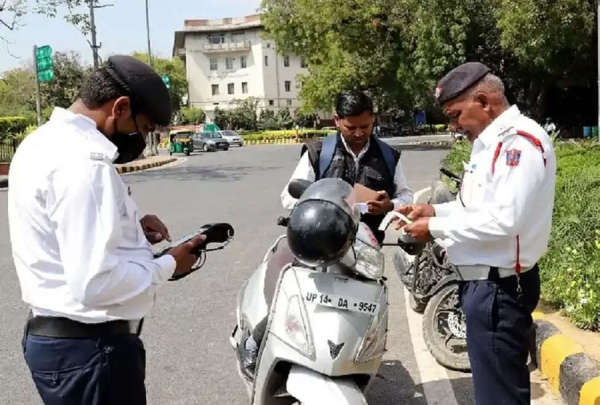
In a move to tighten enforcement of traffic rules, the government is set to introduce stricter regulations for those who fail to pay traffic fines (challans) within three months. The new rules aim to reduce the number of violators and ensure that drivers comply with the law, or face serious consequences. Under these new proposals, drivers who do not clear their e-challans within three months could have their driving licenses suspended. Additionally, individuals who accumulate multiple traffic fines in a year may face higher insurance premiums as a result of their non-compliance.
The government is determined to tackle the issue of non-payment of traffic fines and is considering a stringent new rule to curb the problem. As part of these new measures, drivers who fail to pay their traffic fines within three months of receiving the challan could see their driving licenses suspended. In addition, those who accumulate three or more challans in a given financial year, particularly for serious violations such as jumping red lights or driving dangerously, may face license confiscation for at least three months.
In addition to these penalties, the government is also planning to introduce a new measure that will impact drivers financially. If a vehicle owner has at least two pending challans from the previous financial year, their vehicle insurance premiums may be increased. This will serve as another deterrent for those who repeatedly fail to pay fines. The idea behind this strategy is to make traffic violations more costly, encouraging timely payment of fines and ultimately improving road safety and law enforcement.
These changes are part of a broader effort by the government to tackle the widespread issue of traffic violations and the non-payment of fines. According to sources, the government has identified that only about 40% of traffic fines are currently being collected. This significant gap in fine recovery has prompted the need for stricter measures. By introducing consequences such as license suspensions and increased insurance premiums, the government hopes to deter violators and ensure better compliance with traffic laws.
The new rules have been developed in response to a Supreme Court order which directed 23 states and seven union territories to submit compliance reports regarding the implementation of electronic monitoring systems for traffic law enforcement. The Central Motor Vehicles Act stipulates the use of advanced technologies such as speed cameras, CCTV cameras, speed guns, body-worn cameras, and automatic number plate recognition (ANPR) systems to ensure better management of traffic rules and more effective enforcement.
The problem of unpaid fines is not uniform across the country. In some states and union territories, the rate of fine recovery is much lower than in others. Delhi, for instance, has the lowest fine recovery rate, at only 14%. Other states like Karnataka (21%), Tamil Nadu, and Uttar Pradesh (27%) follow closely behind. In contrast, states such as Rajasthan, Bihar, Madhya Pradesh, Maharashtra, and Haryana have reported a much higher recovery rate, ranging from 62% to 76%. The stark difference in recovery rates highlights the urgency for the government to implement stricter measures.
Several factors contribute to the issue of non-payment of fines. Late payments, inaccurate challans, and a lack of awareness about pending fines are some of the main reasons why individuals delay or fail to pay their traffic fines. To address this, the government plans to introduce a comprehensive standard operating procedure (SOP). This SOP will ensure that there are minimum specifications for cameras used for enforcement and that vehicle owners are reminded repeatedly about their pending fines. Alerts will be sent out on a regular basis to remind drivers of the outstanding fines, making it more likely that they will pay them on time.
With the introduction of these new rules, the government aims to create a more efficient and accountable traffic enforcement system. By implementing measures such as license suspensions for unpaid fines and higher insurance premiums for frequent violators, the government is trying to ensure that traffic laws are respected and adhered to. The stricter penalties also reflect the government's commitment to road safety and reducing traffic-related accidents.
As the new rules are set to come into effect soon, drivers are urged to take their traffic fines seriously and make sure they pay them within the stipulated timeframe. Failure to do so will not only result in increased costs, such as higher insurance premiums, but could also lead to more severe consequences like license suspension.